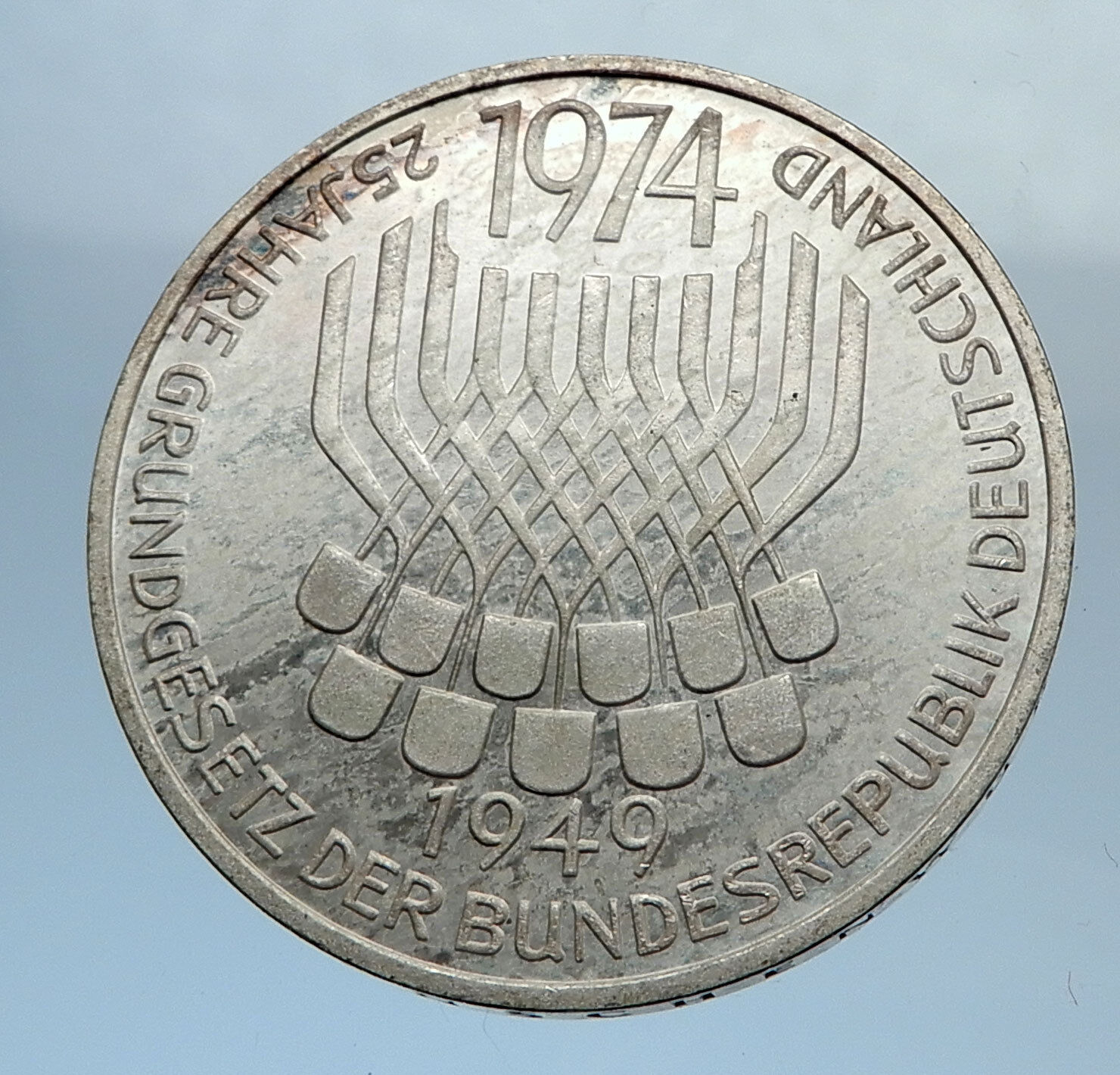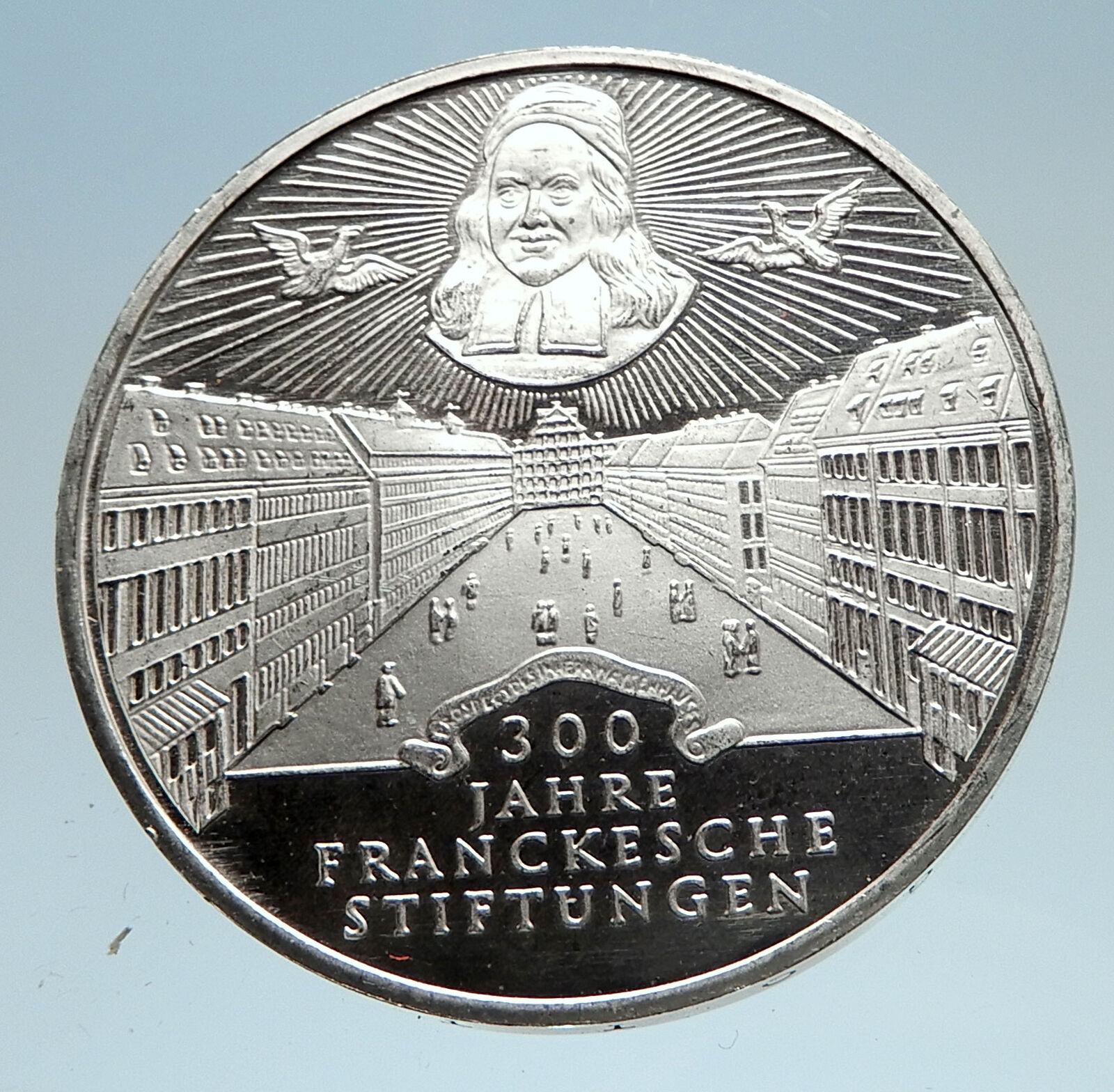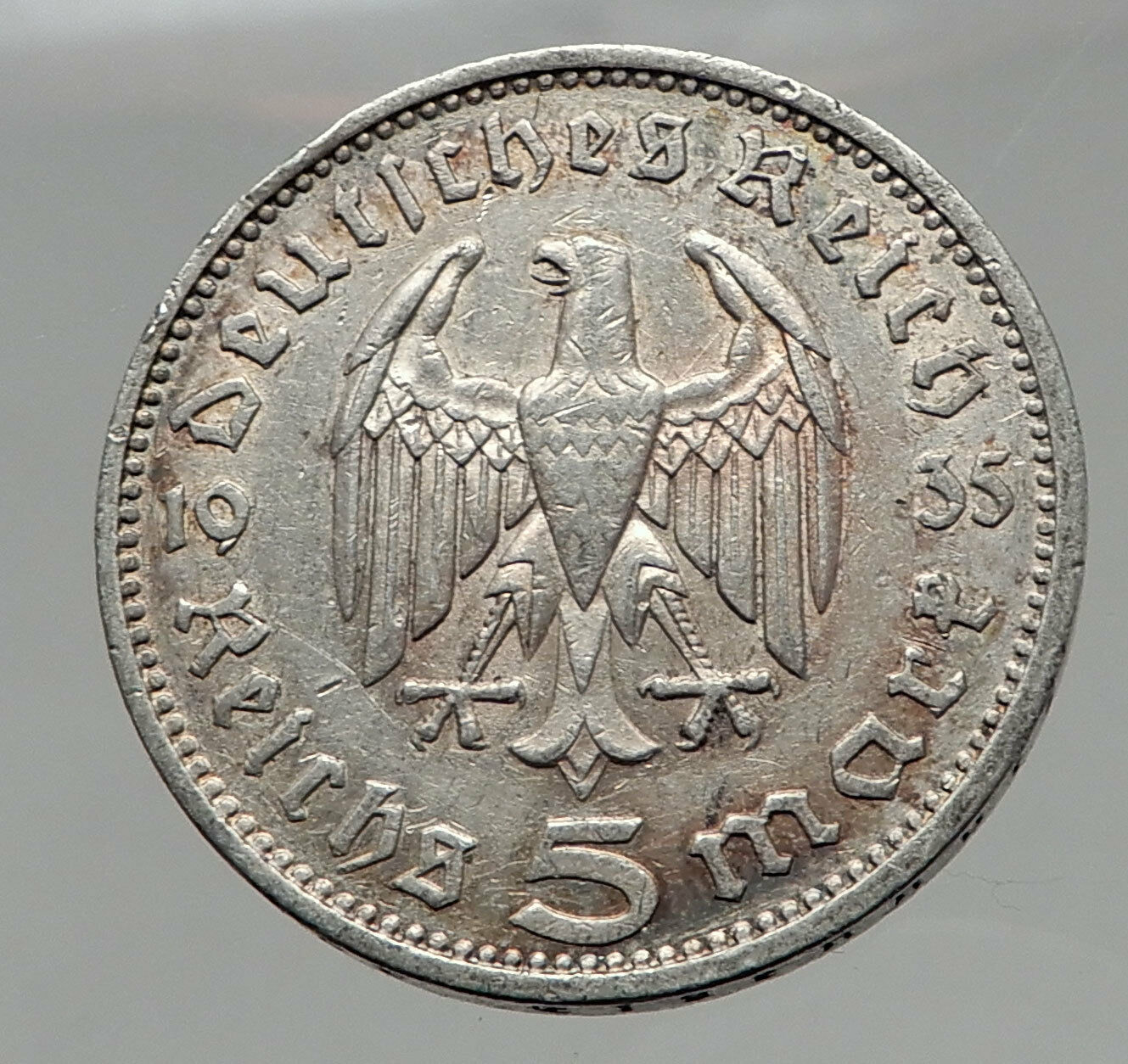|
Germany
150th anniversary Order Pour-le-Merité
1992 D Proof Silver 10 Mark 32mm (15.46 grams) 0.625 Silver (0.3115 oz. ASW)
Reference: KM# 179 | Engraver: Werner Godec
BUNDESREPUBLIK DEUTSCHLAND 10 DEUTSCHE MARK 1992 D, Eagle.
ORDEN POUR LE MERITE FÜR WISSENSCHAFTEN UND KÜNSTE A.v.HUMBOLDT 1.KANZLER DES ORDENS 1842-1992, Alexander von Humboldt with the medal of the “Order Pour Le Merité”
Edge Lettering:
GEMEINSCHAFT VON GELEHRTEN UND KÜNSTLERN
You are bidding on the exact item pictured, provided with a Certificate of Authenticity and Lifetime Guarantee of Authenticity.
 The Pour le Mérite is an order of merit (German: Verdienstorden) established in 1740 by King Frederick II of Prussia. The Pour le Mérite was awarded as both a military and civil honour and ranked, along with the Order of the Black Eagle, the Order of the Red Eagle and the House Order of Hohenzollern, among the highest orders of merit in the Kingdom of Prussia. After 1871, when the various German kingdoms, grand duchies, duchies, principalities and Hanseatic city states had come together under Prussian leadership to form the federally structured German Empire, the Prussian honours gradually assumed, at least in public perception, the status of honours of Imperial Germany, even though many honours of the various German states continued to be awarded. The Pour le Mérite is an order of merit (German: Verdienstorden) established in 1740 by King Frederick II of Prussia. The Pour le Mérite was awarded as both a military and civil honour and ranked, along with the Order of the Black Eagle, the Order of the Red Eagle and the House Order of Hohenzollern, among the highest orders of merit in the Kingdom of Prussia. After 1871, when the various German kingdoms, grand duchies, duchies, principalities and Hanseatic city states had come together under Prussian leadership to form the federally structured German Empire, the Prussian honours gradually assumed, at least in public perception, the status of honours of Imperial Germany, even though many honours of the various German states continued to be awarded.
The Pour le Mérite was an honour conferred both for military (1740–1918) and civil (1740–1810, after 1842 as a separate class) services. It was awarded strictly as a recognition of extraordinary personal achievement, rather than as a general marker of social status or a courtesy-honour, although certain restrictions of social class and military rank were applied. The order was secular, and membership endured for the remaining lifetime of the recipient, unless renounced or revoked.
During the First World War, the Pour le Mérite was known informally as the Blue Max (German: Blauer Max), in honour of flying ace Max Immelmann, the first recipient during the war. Immelmann was also the first aviator ever to win the award.[4]
New awards of the military class ceased with the end of the Prussian monarchy in November 1918. The civil class was revived as an independent organization in 1923 (Pour le Mérite für Wissenschaften und Künste). Instead of the King of Prussia, the President of Germany acted as head of the order. After the Second World War, the civil class was re-established in 1952. This version of the Pour le Mérite is still active today. The Pour le Mérite is still an order into which a person is admitted into membership, like the United Kingdom’s Order of the British Empire, and is not simply a medal or state decoration. German author Ernst Jünger, who died in 1998, was the last living recipient of the military class award.
 Germany, officially the Federal Republic of Germany is a federal parliamentary republic in western-central Europe. It includes 16 constituent states and covers an area of 357,021 square kilometres (137,847 sq mi) with a largely temperate seasonal climate. Its capital and largest city is Berlin. With 81 million inhabitants, Germany is the most populous member state in the European Union. After the United States, it is the second most popular migration destination in the world. Germany, officially the Federal Republic of Germany is a federal parliamentary republic in western-central Europe. It includes 16 constituent states and covers an area of 357,021 square kilometres (137,847 sq mi) with a largely temperate seasonal climate. Its capital and largest city is Berlin. With 81 million inhabitants, Germany is the most populous member state in the European Union. After the United States, it is the second most popular migration destination in the world.
 Various Germanic tribes have occupied northern Germany since classical antiquity. A region named Germania was documented before 100 CE. During the Migration Period the Germanic tribes expanded southward. Beginning in the 10th century, German territories formed a central part of the Holy Roman Empire. During the 16th century, northern German regions became the centre of the Protestant Reformation. Various Germanic tribes have occupied northern Germany since classical antiquity. A region named Germania was documented before 100 CE. During the Migration Period the Germanic tribes expanded southward. Beginning in the 10th century, German territories formed a central part of the Holy Roman Empire. During the 16th century, northern German regions became the centre of the Protestant Reformation.
 The rise of Pan-Germanism inside the German Confederation resulted in the unification of most of the German states in 1871 into the Prussian-dominated German Empire. After World War I and the German Revolution of 1918-1919, the Empire was replaced by the parliamentary Weimar Republic. The establishment of the Third Reich in 1933 led to World War II and the Holocaust. After 1945, Germany split into two states, East Germany and West Germany. In 1990, the country was reunified. The rise of Pan-Germanism inside the German Confederation resulted in the unification of most of the German states in 1871 into the Prussian-dominated German Empire. After World War I and the German Revolution of 1918-1919, the Empire was replaced by the parliamentary Weimar Republic. The establishment of the Third Reich in 1933 led to World War II and the Holocaust. After 1945, Germany split into two states, East Germany and West Germany. In 1990, the country was reunified.
In the 21st century, Germany is a great power and has the world’s fourth-largest economy by nominal GDP, as well as the fifth-largest by PPP. As a global leader in several industrial and technological sectors, it is both the world’s third-largest exporter and importer of goods. Germany is a developed country with a very high standard of living sustained by a skilled and productive society. It upholds a social security and universal health care system, environmental protection and a tuition free university education.
Germany was a founding member of the European Union in 1993. It is part of the Schengen Area, and became a co-founder of the Eurozone in 1999. Germany is a member of the United Nations, NATO, the G8, the G20, and the OECD. The national military expenditure is the 9th highest in the world. Known for its rich cultural history, Germany has been continuously the home of influential artists, philosophers, musicians, sportsmen, entrepreneurs, scientists and inventors.
|





 The Pour le Mérite is an order of merit (German: Verdienstorden) established in 1740 by King Frederick II of Prussia. The Pour le Mérite was awarded as both a military and civil honour and ranked, along with the Order of the Black Eagle, the Order of the Red Eagle and the House Order of Hohenzollern, among the highest orders of merit in the Kingdom of Prussia. After 1871, when the various German kingdoms, grand duchies, duchies, principalities and Hanseatic city states had come together under Prussian leadership to form the federally structured German Empire, the Prussian honours gradually assumed, at least in public perception, the status of honours of Imperial Germany, even though many honours of the various German states continued to be awarded.
The Pour le Mérite is an order of merit (German: Verdienstorden) established in 1740 by King Frederick II of Prussia. The Pour le Mérite was awarded as both a military and civil honour and ranked, along with the Order of the Black Eagle, the Order of the Red Eagle and the House Order of Hohenzollern, among the highest orders of merit in the Kingdom of Prussia. After 1871, when the various German kingdoms, grand duchies, duchies, principalities and Hanseatic city states had come together under Prussian leadership to form the federally structured German Empire, the Prussian honours gradually assumed, at least in public perception, the status of honours of Imperial Germany, even though many honours of the various German states continued to be awarded. Germany, officially the Federal Republic of Germany is a federal parliamentary republic in western-central Europe. It includes 16 constituent states and covers an area of 357,021 square kilometres (137,847 sq mi) with a largely temperate seasonal climate. Its capital and largest city is Berlin. With 81 million inhabitants, Germany is the most populous member state in the European Union. After the United States, it is the second most popular migration destination in the world.
Germany, officially the Federal Republic of Germany is a federal parliamentary republic in western-central Europe. It includes 16 constituent states and covers an area of 357,021 square kilometres (137,847 sq mi) with a largely temperate seasonal climate. Its capital and largest city is Berlin. With 81 million inhabitants, Germany is the most populous member state in the European Union. After the United States, it is the second most popular migration destination in the world. Various Germanic tribes have occupied northern Germany since classical antiquity. A region named Germania was documented before 100 CE. During the Migration Period the Germanic tribes expanded southward. Beginning in the 10th century, German territories formed a central part of the Holy Roman Empire. During the 16th century, northern German regions became the centre of the Protestant Reformation.
Various Germanic tribes have occupied northern Germany since classical antiquity. A region named Germania was documented before 100 CE. During the Migration Period the Germanic tribes expanded southward. Beginning in the 10th century, German territories formed a central part of the Holy Roman Empire. During the 16th century, northern German regions became the centre of the Protestant Reformation. The rise of Pan-Germanism inside the German Confederation resulted in the unification of most of the German states in 1871 into the Prussian-dominated German Empire. After World War I and the German Revolution of 1918-1919, the Empire was replaced by the parliamentary Weimar Republic. The establishment of the Third Reich in 1933 led to World War II and the Holocaust. After 1945, Germany split into two states, East Germany and West Germany. In 1990, the country was reunified.
The rise of Pan-Germanism inside the German Confederation resulted in the unification of most of the German states in 1871 into the Prussian-dominated German Empire. After World War I and the German Revolution of 1918-1919, the Empire was replaced by the parliamentary Weimar Republic. The establishment of the Third Reich in 1933 led to World War II and the Holocaust. After 1945, Germany split into two states, East Germany and West Germany. In 1990, the country was reunified.




